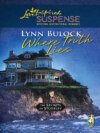Loe raamatut: «The Sound of Secrets»
“Mick invites me to church every week. When we clear up this newest case, I’m going to surprise him and go,” Drew said.
Rissa beamed in his direction. “That will make me very happy.” She stood and started toward him. He met her halfway, and she gave him both of her hands.
He pulled her into a brief embrace, and Rissa relaxed and enjoyed the closeness of him. Being held in his arms made her feel secure and safe. It was the kind of caress she would have given to anyone who had rededicated his life to God. But she knew it signaled something more. She not only found security in Drew’s arms, but peace as well. Was she ready for what was developing between them?
THE SECRETS OF STONELEY:
Six sisters face murder, mayhem and mystery while unraveling the past.
FATAL IMAGE—Lenora Worth (LIS#38)
LITTLE GIRL LOST—Shirlee McCoy (LIS#40)
BELOVED ENEMY—Terri Reed (LIS#44)
THE SOUND OF SECRETS—Irene Brand (LIS#48)
DEADLY PAYOFF—Valerie Hansen (LIS#52)
WHERE TRUTH LIES—Lynn Bulock (LIS#56)
MILLS & BOON
Before you start reading, why not sign up?
Thank you for downloading this Mills & Boon book. If you want to hear about exclusive discounts, special offers and competitions, sign up to our email newsletter today!
Or simply visit
Mills & Boon emails are completely free to receive and you can unsubscribe at any time via the link in any email we send you.
IRENE BRAND
Writing has been a lifelong interest of this author, who says that she started her first novel when she was eleven years old and hasn’t finished it yet. However, since 1984 she’s published more than thirty contemporary and historical novels and three nonfiction titles. She started writing professionally in 1977 after she completed her master’s degree in history at Marshall University. Irene taught in secondary public schools for twenty-three years, but retired in 1989 to devote herself to writing.
Consistent involvement in the activities of her local church has been a source of inspiration for Irene’s work. Traveling with her husband, Rod, to all fifty states and to thirty-two foreign countries has also inspired her writing. Irene is grateful to the many readers who have written to say that her inspiring stories and compelling portrayals of characters with strong faith have made a positive impression on their lives. You can write to her at P.O. Box 2770, Southside, WV 25187 or visit her Web site at www.irenebrand.com.
Irene Brand
The Sound of Secrets

Special thanks and acknowledgment are given to Irene Brand for her contribution to THE SECRETS OF STONELEY miniseries.
“Because thou hast made the Lord, which is my refuge, even the most High, thy habitation; there shall no evil befall thee, neither shall any plague come nigh thy dwelling. For he shall give his angels charge over thee, to keep thee in all thy ways. They shall bear thee up in their hands, lest thou dash thy foot against a stone.”
—Psalms 91:9–12
I want to dedicate this book to the five
other authors with whom I’ve worked on
THE SECRETS OF STONELEY
continuity series—Lynn Bulock, Shirlee McCoy,
Lenora Worth, Terri Reed and Valerie Hansen.
It’s been a pleasure to work with them.
CONTENTS
PROLOGUE
CHAPTER ONE
CHAPTER TWO
CHAPTER THREE
CHAPTER FOUR
CHAPTER FIVE
CHAPTER SIX
CHAPTER SEVEN
CHAPTER EIGHT
CHAPTER NINE
CHAPTER TEN
CHAPTER ELEVEN
CHAPTER TWELVE
CHAPTER THIRTEEN
CHAPTER FOURTEEN
CHAPTER FIFTEEN
CHAPTER SIXTEEN
CHAPTER SEVENTEEN
QUESTIONS FOR DISCUSSION
PROLOGUE
Illuminated by the faint light of a half moon, Blanchard Manor resembled a phantom house. Swept inland by a brisk wind from the turbulent Atlantic, thick fog shrouded the stately mansion with wispy white tendrils. The faint scent of seaweed blended with the pungent fragrance of spruce trees. It was a peaceful night and quietness reigned on the promontory. Presumably the inhabitants of the mansion had long since gone to bed.
A man stealthily opened a side door of the mansion. He paused briefly to survey the moonlit scene before he strode purposefully toward the gazebo at the edge of the manicured lawn. Stopping once, he looked upward at the house, wondering if his daughters were sleeping. He climbed the steps into the gazebo, questioning how long he would have to wait. Not long, he thought. His expected visitor wouldn’t be late when her financial future hung in the balance.
A figure, swathed in a hooded raincoat, approached the gazebo and hesitated in the shadow of an ancient, sprawling maple tree before entering the small, wooden structure. Soon the wheedling tones of the woman were muffled by the man’s strident, angry voice.
The argument intensified, and two faces appeared at a window in the mansion. Kneeling with their arms folded on the sill, the sisters strained their eyes to discover the identity of their father’s mysterious visitor. Finally, Ronald Blanchard’s voice rang out loud and clear in the stillness of the night.
“If you ever darken my doorstep again, I’ll have you killed.”
A shaft of moonlight swept across the lawn and highlighted the figure of a tall, powerfully built man with his hand lifted as though to strike the woman. Was he holding a knife? A cloud covered the moon and the gazebo was again plunged into darkness.
The man stormed angrily across the lawn and disappeared into the house, but what had happened to the visitor? A door slammed downstairs, leaving the two sisters alarmed and troubled. They returned to their beds, but not to sleep. Would there ever be an end to the troubles that plagued the Blanchard family?
ONE
With misgiving, Nerissa Blanchard strapped two bags on the luggage carrier and looked longingly around her trendy apartment. How she dreaded the upcoming visit to her family’s home in Stoneley, Maine! It wasn’t as if she’d been away for a long time. She had made two quick trips to Blanchard Manor in the past two months.
Since moving to New York City four years ago, the days that Rissa spent away from the exciting metropolis felt as barren as if she’d been stranded on a desert island. And this trip was also unwelcome because Rissa definitely didn’t want to be involved in her twin’s wedding.
But what else could she do? Portia had called a few days ago and insisted that she needed Rissa’s help to complete her wedding plans.
She couldn’t disappoint her sister—they had always been inseparable, and now she would be sharing her twin with Stoneley Police detective Mick Campbell. Rissa hadn’t gotten used to the idea yet, but she wanted her twin to be happily married. Drew Lancaster, Mick’s sometimes partner, a man she preferred to steer clear of, was her real reason for avoiding the wedding. However, she was determined to be Portia’s maid of honor in spite of the fact that Drew would be Mick’s best man.
She had only met Drew once—no more than a few hours during her last visit to Maine—so why did thoughts of the man infiltrate many of her waking hours as well as her dreams? Rissa couldn’t understand. No one was less likely to fit into her life than a small-town cop without a literary thought in his head. Wrapped up in her career, especially the new play she was writing, she had almost succeeded in putting Drew out of her mind. If only Portia’s fiancé hadn’t picked Drew to be in the wedding party!
Rissa begrudged every minute she had to spend away from the city, but she and Portia had always been there for each other. There was no way she could refuse to help her twin plan the biggest day of her life.
As she finished dressing, Rissa put aside her personal problems and considered the latest news from home—another reason she dreaded going to Stoneley. She had believed all of her life that their mother, Trudy, had died in an automobile accident when the twins were only three. But their father had finally admitted to faking his wife’s death to spare his daughters the grief of knowing that their mother had sunk into a severe case of postpartum depression following the birth of their youngest sister. This new development in the family’s dysfunctional history was almost more than Rissa could bear, especially since their mother had escaped from the mental institution almost eight months ago. No one had heard from her since then.
Rissa took a last look in the mirror, satisfied with her appearance. She loved the old-world feel of her newest outfit—a long, black velvet tuxedo jacket and pants complemented by a frilly, open-necked white cotton blouse. She put on a pair of black-and-white leather-and-suede flats and pulled her long, curly black hair behind her left ear, fastening it securely with a silver clip.
Hoping that the newest family revelation would be handled by the time she arrived at her Maine home, Rissa locked the door behind her and took an elevator to the parking area in the basement. She ran her hands approvingly along the side of the sleek, navy-blue Porsche that she’d bought over a year ago. Except for Portia, who never questioned anything Rissa did, the family hadn’t hesitated to give an opinion that she was foolish to spend so much money on a car that she seldom used. No one knew better than Rissa that getting around in the city was best done by subway, but when she wanted to go outside the city, she liked the freedom of owning her own car.
Hoping she wouldn’t have to be away more than a week, Rissa pulled out of the garage and began her journey. Because she preferred to travel at night, long after rush hour, once on the interstate, the trip to Stoneley would pass quickly. After she started northeast and was out of the heaviest city traffic, Rissa inserted a CD containing the theme music of her off-Broadway play, Memories of the Past, which had become a smash hit. The miles passed quickly as she listened to the musical scores and plotted her next play.
Daylight found Rissa within fifty miles of her destination, and she reveled in the beauty of the quiet countryside. A misty sunrise highlighted the villages where powerboats were leaving secluded harbors for the turbulent fishing waters of the Atlantic. A solid mass of spruce trees crowned the bluffs to the west. When she passed through marshlands, black ducks and green herons took wing at her approach.
In spite of her love for the city, a thrill of pride in her native state swelled in Rissa’s heart. The coast of Maine was rugged, powerful and breathtaking. God must have given an extra portion of His time to this area when He created the world.
Rissa hadn’t told her family that she was making a night drive to Stoneley, so when she was within twenty miles of home, she pulled into a rest stop to call them. Her oldest sister, Miranda, answered the phone.
“Good morning,” Rissa said. “I’ll be home in a half hour. You can warn Andre that I haven’t had any breakfast!”
“Rissa! You surely didn’t drive all that way alone, and at night! It isn’t safe,” Miranda said, giving her usual unsolicited advice—as she always did—to her younger siblings.
“But I made it!”
She had expected a long lecture on the subject, but Miranda said, “We haven’t had breakfast yet. Something terrible happened here last night. Be careful!”
Rissa held the phone away from her ear. Miranda had hung up on her! What could possibly be wrong at Blanchard Manor to cause her always socially correct sister to be rude? She had hoped that this short visit would be more peaceful than previous ones, such as when her family had been under suspicion in the murder of Garrett McGraw, a private detective her sister Bianca had hired to learn about their mother’s death. Sensing that wouldn’t be the case, Rissa sighed, joined the flow of traffic on the highway and headed for home.
Despite the sadness that had infiltrated the house as long as Rissa could remember, her heart swelled when Blanchard Manor came into view. She gazed fondly upward at the huge stone mansion with its castlelike facade, though she dreaded what new trouble had descended upon the Blanchard family.
Rissa punched in the security code at the gate and started toward the house.
Aunt Winnie, her father’s sister—the only mother Rissa could remember—never failed to be standing on the small porch, waiting expectantly when she returned home. Aunt Winnie was waiting, but she wasn’t her neat, usual self. She still wore her pajamas and robe, and her hair obviously hadn’t been combed since she’d gotten out of bed.
Instead of driving to the six-car garage at the side of the house, Rissa swung her Porsche into the circular drive and stopped abruptly. Leaving the door ajar, she ran toward her aunt as Miranda and Portia stepped into view, leaving the huge, wooden stained-glass door open.
“What’s happened?” she asked.
“Come inside, dear,” Winnie said as she leaned forward to kiss Rissa’s cheek. Rissa’s shoes clacked noisily on the marble-floored foyer. Inside the spacious hallway, her eyes were drawn toward the walnut staircase supported by heavy, ornate balustrades—a sight that had welcomed visitors to Blanchard Manor for years.
With an anxious glance at Ronald’s office, Winnie motioned toward the room to the right of the hallway.
“Let’s go to the living room,” she murmured, and they walked quietly into the room that hadn’t changed much in appearance since Rissa could remember.
Her sisters and Aunt Winnie sat on the twin settees grouped around a large coffee table.
“What’s happened?” she repeated when the door closed behind them.
Winnie motioned for Rissa to sit beside her.
“I’ve been sitting all night,” Rissa said, leaning against the closed door. “I’ll stand for a while. Don’t keep me in suspense—what’s wrong?”
“There was a terrible scene in the gazebo last night,” Miranda said.
“Terrible? What do you mean? Has someone else been killed?” Rissa demanded, irritated that they seemed to be beating around the bush.
“I don’t think so,” Portia answered. “We couldn’t see in the dark, but I checked as soon as daylight came. There wasn’t a body in the gazebo. The woman must have gotten away.”
“It happened about midnight,” Winnie said. “Ronald was in the gazebo with a woman. He shouted at the top of his lungs and woke the entire household. There must have been a terrible argument. I don’t suppose anybody slept after that.”
“Another woman? What’s happened to Alannah, his latest flame?”
With a disgusted sniff, Miranda said, “Oh, she’s still around, unfortunately. This definitely wasn’t a romantic tryst.”
“That’s right. He threatened the woman’s life if she shows up here again,” Portia said. “Father didn’t come upstairs after that, but spent the night in his office.”
A disturbing thought popped into Rissa’s head and fearful images built in her mind. “But he is all right, isn’t he?” she asked hesitantly.
“I’ve listened at the keyhole a few times,” Miranda answered. “He’s muttering and pacing the floor like a madman, and it sounds like he’s kicking the furniture when it’s in his way.”
Was her father deranged, too? Her mother had experienced serious postpartum depression. Now that Rissa’s psychiatrist had prescribed an antidepressant for her, Rissa feared that she had inherited her mother’s instability.
What if her father’s mind was also unbalanced? Dr. Pearson, her psychiatrist, had assured Rissa that she had only a mild case of clinical depression and had prescribed a low dose of antidepressants to combat her symptoms. But recalling some of Ronald’s temper displays, and his uncaring attitude toward his six daughters, she wondered if her condition was worse than the psychiatrist had diagnosed. And her grandfather, Howard, had Alzheimer’s. What chance did she have against such odds? Would she eventually lose her mind?
Rissa had chosen a Christian psychiatrist, one who counseled her patients with Biblical teachings along with traditional treatment. During the therapy sessions, Rissa often felt as if she were a child again in her Sunday school class at Unity Christian Church. Upon Dr. Pearson’s advice, Rissa had memorized a few Bible verses that she called to mind anytime she became depressed. The doctor had insisted that a daily dose of Scripture would be an added benefit to her medication.
Rissa suddenly realized that her aunt had spoken to her twice and that her sisters were staring at her in concern. She forced a slight laugh.
“Sorry! I’ve had a long night. What did you say?”
“We waited to have breakfast with you,” Aunt Winnie said. “Are you ready to eat?”
“Sure. Give me a minute to run upstairs and freshen up.”
“I’ll bring your luggage,” Portia said.
“Put it in our bedroom. I’ll wash my hands and face and then join everyone in the dining room.”
During breakfast Rissa forced an upbeat manner as she chatted with her aunt and sisters, answering their questions about the success of Memories of the Past.
“We saw a glowing review in the local paper,” Miranda said. “‘Hometown Girl Makes a Splash in the Big Apple.’ If an article makes it into our paper, you can be assured that the news has spread nationwide.”
“I am pleased with public reception to my play,” Rissa said, smothering a yawn. “My agent encouraged me to start working on another one right away, so I’ve been busy writing a new one.”
“Now that Portia will be moving back to Stoneley, won’t you be lonesome in the big city?” Aunt Winnie asked. “Why don’t you come home? Seems to me you could write as well here as in New York.”
“I could never be lonely in New York. It is my home now,” Rissa said. “Coming to Stoneley seems like the end of the world. I can’t imagine anything that would entice me to live here again.”
“It isn’t a good thing to forget your roots,” Miranda scolded, and Rissa knew she had sounded a little supercilious. She didn’t mean to be that way and decided she would have to work on her attitude. But her relatives who had never lived in the city couldn’t understand how life on the fast track had changed her priorities.
Missing her youngest sister, Rissa asked, “Has Juliet already gone to work this morning?”
“She’s in Florida on a business trip and will be gone for a week or two,” Winnie explained.
“Tough luck,” Rissa said, with a humorous uplift of her carefully tweaked brows. “Having to leave Maine for a trip to Florida this time of year must have been a real sacrifice.”
“Well, it was in a way,” Portia said. “She didn’t want to leave her boyfriend behind.”
Rissa had been introduced to Brandon De Witte, whom Juliet had met recently. It must have been love at first sight because the romance seemed to be moving forward rapidly.
After breakfast Rissa took a shower, went to bed and slept until noon. When she was awakened by a knock on the door by her aunt, who announced that lunch was ready, she dressed hurriedly in black silk pants and a hot-pink long-sleeved blouse. A pair of metallic leather flat shoes completed her outfit. She brushed her hair over her shoulders and went downstairs to the news that her father had finally come out of his office, gone to his bedroom, dressed and left for his job as the steel-hearted CEO of Blanchard Fabrics. The women ate lunch alone.
“Do you suppose I can see Grandfather this afternoon?” Rissa asked as they finished the light lunch of crab soup, raw vegetables and cherry torte.
“According to Peg, he isn’t having a good day,” Miranda said. “She said she would let you know when he’s lucid.”
“I don’t know what we would do without Peg,” Rissa said of the sweet-natured nurse who took care of their grandfather round the clock. “Does she ever take a day off?”
“I could count on one hand the time she’s been away from the house during the past five years,” Winnie said. “But it’s her fault—we’ve tried to get her to take more time off. She says she doesn’t know what else she would do.”
“She doesn’t have any family in this area at all,” Miranda said. “She specializes in long-term care and lives in the homes of the families she helps. She apparently doesn’t have a place of her own.”
“Well, we’re fortunate to have her,” Rissa said.
When Winnie rang for the maids to clear the table, Rissa said, “I need a walk along the seawall. Portia, why don’t you walk with me to the bluffs? After all, the main reason I’m here is to help plan your wedding. We can make plans as we walk.”
“You can’t go walking in those clothes,” Miranda said, casting a disdainful eye at the garments that had set Rissa back several hundred dollars. “This isn’t New York City. You’d better take off that fancy outfit and dress for the weather up here. Remember, it’s still April, and you know that we often have snow this time of year.”
Rissa winced a little at the censure in her sister’s voice. Miranda didn’t understand that in this house, she had to have something tangible, like her city clothes, to remind her that there was another life waiting for her.
“Snow! Don’t tell me it’s going to snow.”
“No,” Portia said. “The weather forecast is for thunderstorms, but it’s still cold outside.” Turning to Miranda, she continued, “I’m sure she didn’t intend to walk in those clothes,” taking up for her twin as she always did. “Our heavy coats and boots are in the hall closet upstairs, sis. I’ll go get them.”
The twins rarely wore matching clothes anymore, but when they left the house in the jackets they had worn when they’d been teenagers, they looked like two peas in a pod. Although the calendar said it was April, and bright sunshine blanketed the estate, the brisk wind from the ocean reminded them that winter hadn’t given up yet.
Portia shuddered when they walked past the gazebo. “I thought Father had killed someone here last night. Who could he be threatening?”
“A better question is ‘Who’s threatening him?’ Most of the time, he’s a stranger to me. I often feel as if we not only grew up without a mother but without a father, too. He never has any time for us.”
“Or for anyone except his latest paramour.” Portia sighed. “He’s still dating Alannah Stafford, and I don’t think she has any intention of letting him go.”
“I’d hoped he had dumped her by now. But let’s forget unpleasant things. Let’s talk about that wonderful fiancé of yours.”
“He is wonderful! If anyone had told me six months ago that I would be in love and looking forward to not only having a husband but a daughter, too, I wouldn’t have believed them. After breaking up with Tad, I didn’t think I would ever trust another man, but Mick is so good for me, and I love Kaitlyn, too. I’ve always wanted a family of my own.”
“Well, you must have gotten all of the maternal genes. I can’t imagine myself being a mother. I like little kids, although I haven’t seen one yet that I wanted to take home with me. But I’m happy for you. When’s the wedding?”
“We haven’t set a date yet. We’re planning a small church wedding with just three attendants. Kaitlyn wants to be a flower girl, and of course you’ll be my maid of honor. As I told you, Mick asked his friend, Drew Lancaster, to be the best man. You remember Drew, don’t you?”
Staring straight ahead so Portia wouldn’t detect that she had more than a casual interest in Drew, Rissa said, “Yes, I met him during the investigation into Garrett McGraw’s death.”
A frigid gust of wind staggered the sisters as they walked arm in arm. Rissa had grown accustomed to a slightly milder climate and the strong blast chilled her to the bone.
Portia seemed less daunted by the strong gale, and she continued, “I wanted your help in choosing the dresses we’ll wear. We’ve never had the same tastes, and I need your input. We’ll have to shop in Portland—there are no bridal shops in Stoneley.”
“The logical thing would have been for you to come to the city to shop for your bridal attire. There won’t be as much choice up here.”
“I know, but Mick wants to keep the wedding simple. He’s a little put-off with the Blanchard wealth and social standing anyway, and I don’t want him intimidated by an expensive wedding. Detectives make a good salary, but he has a daughter to care for…and kids are expensive.”
“And where will you live?”
“Mick has an adorable little cottage overlooking the ocean. It’s small, but he’s adding another bedroom and a bathroom for us.” Portia looked quickly at her twin. “I’ve wondered if I’m leaving you in the lurch since I won’t be paying my share of the rent. You like the apartment so much—I hope you won’t have to give it up.”
“Don’t worry about that. The profits from my show will easily make up for your share of the rent.”
A tremor in her voice, Portia said, “It’s hard for me to imagine that you and I won’t be living together anymore. We’ve always been inseparable. Now I’ll be staying in Maine with a husband and a daughter, and you’ll be in New York by yourself. I wish you’d move back to Maine.”
Although Rissa had been having similar thoughts about being separated from Portia, she laughed nonchalantly. “Do you think I could ever be happy in Stoneley again? There probably aren’t more than a half dozen people in this area who have even seen a Broadway show, let alone have any idea of what it takes to write and produce one.” She shook her head, realizing that she sounded pretentious again. “I’ll miss being with you, sweetie. But you and I have to go our separate ways now. I need to be around people who understand me and my purpose in life.”
“I know! But it will be different,” Portia murmured.
“Very different! While I was driving last night I got a little nostalgic. I remembered so many things about us. Being a twin is wonderful. When we were little, I never bothered with a mirror. If I wanted to know what I looked like, I looked at you. And do you remember the time I wanted a new hairstyle, and while you were asleep, I cut your hair to see how I would look with short hair?”
“Do I remember? That’s the first time we ever had a fight. And I thought Aunt Winnie was going to spank you.” They both giggled remembering the experience.
With a grimace, Rissa said, “Instead of spanking me, she cut my hair, and she didn’t know any more about styling hair than I did. After I saw what you looked like, I’d made up my mind I didn’t want short hair, but I got it, anyway. Even now, I dread going for a trim—I’m afraid I’ll hate it like I did my first haircut.” They both giggled.
“And I never had any trouble buying a gift for you—I just bought something I liked.”
“But we didn’t always choose the same kind of clothes,” Rissa commented.
“That’s because we’re not entirely identical—we are separate people.”
“Well, it’s been a great ride while it lasted.”
“Oh, don’t talk like it’s all in the past, sis. Surely we’ll have more fun times together.”
“Count on it!” Rissa agreed. “I’ll leave your room in the apartment the way it is now—mess and all,” she added with a grin because Portia’s room was always cluttered. By contrast, in Rissa’s bedroom, everything had its place. “It will be ready whenever you want to bring your family to visit.”
They came to the end of the cliff walk. “Let’s go back through the spruce forest,” Portia said. They turned to cross Bay View Road but paused when they saw a police cruiser approaching.
“Well, well!” Rissa said with a teasing glance at her sister. “Here comes that wonderful man now.”
Portia shook her head. “That isn’t Mick. It’s his partner, Drew.”
The large cruiser slid to a halt and the window lowered before Rissa got control of her emotions.
“Hello, ladies,” Drew said in a deep-timbered, composed voice that Rissa remembered all too well. He was ruggedly handsome with short, chestnut-brown hair and assessing dark eyes that were presently flickering with amusement. “I think I need to visit an optometrist—I’m seeing double.”
Bending forward until her eyes were on a level with his, Portia said, “Oh, you tease. This is my sister, Rissa.”
“It’s great to see you again, Rissa.”
“Same here,” Rissa replied evenly, having regained her composure. “I understand we’ll have the responsibility of keeping the bride and groom cool, calm and collected during their wedding.”
“So I’ve been told, but who’s going to keep us from being nervous?”
“We’ll have to lean on each other,” Rissa answered, irritated because she was enjoying this good-natured bantering. But her smile faded when she thought about Drew’s small-town position—he could never be husband material. Like oil and water—city and small town wouldn’t mix. She was determined to put him out of her mind.
“What are you doing out here?” Portia asked. “Not on official business, I hope.”
“Actually I am. We had an anonymous tip about an altercation between a man and a woman here in the gazebo last night. The message came from a cell phone and we couldn’t trace the call. Mick was busy on another case so he sent me to investigate. What do you know about it?”
Rissa cleared her throat and pulled on her left earlobe, one of their secret communication codes. Portia looked at her quickly, having gotten the message that she shouldn’t give out any information.
“Nothing happened that should concern the cops,” Portia said. “Just a family matter—and I’m sure that Father wouldn’t want any publicity about it. He’s seen about all the police and reporters he wants to during the past few months.”
“Well, I’ll take a look anyway, if you don’t mind. Is the gate locked?”
“No, it shouldn’t be. During the daytime, it’s usually open for the help and delivery service to come and go,” Rissa said.
Putting the cruiser into motion, Drew said, “Enjoy your walk.”






















